"The point of view depends on where you stand," – says Adib Shaheen, an activist and writer of Palestinian-Ukrainian origin who was forced to settle in England since the beginning of the full-scale invasion of Ukraine by Russian troops. With these words, he criticizes the limited views of people who are influenced by propaganda. Adib calls himself a Marxist, he studied in Ukraine during the Soviet era and has Ukrainian citizenship. He always comes to solidarity rallies with Ukraine, as well as to solidarity rallies with Palestine, with the flags of both his countries. His forthcoming book will be precisely about this: his struggle, his life story, and his camaraderie.
Unlike most Ukrainians, Adib Shaheen had already suffered from imperialist military actions before, as he was born in Jordan and lived in Palestine for several decades. His hometown, Nablus, is located between two mountains, each with an Israeli paramilitary stronghold that controls the city, where Muslims, Jews, and Christians have lived peacefully for centuries. Therefore, Adib knows firsthand what life under occupation is like. He considers the struggle against imperialism and for the practical implementation of the Declaration of Human Rights to be his life's work. We invite you to meet this extraordinary man of peace and struggle for equality.
Tell us, what do you do as an activist?
Before the full-scale invasion, I lived in Ukraine, and in 2022 I fled to the UK. Here I met different people who are engaged in two issues that are important to me. Firstly – support for Ukraine in the war against Russian aggression and solidarity with it. And secondly – support for and solidarity with the Palestinian people. There are people who are simultaneously members of the Palestine Solidarity Campaign and the Ukraine Solidarity Campaign. Why? Because they believe that the struggle for a just future and the support of peoples resisting aggression and repression are the same struggle. Geography does not play any role. Of course, there are peculiarities in each case, but it is the same battle. When I say: "I am fighting for justice," I am fighting for justice in Ukraine, Palestine, and Kashmir.
I met with people from the Palestine Solidarity Campaign and the Ukraine Solidarity Campaign and joined their activities. There are, of course, some concerns, but overall it is a good initiative. They were collecting humanitarian aid for Ukraine. And then we saw the outburst of Israeli aggression against the Gaza Strip and the West Bank, where my hometown, Nablus, is located. Although it is not as brutal in its scale as Russia's war against Ukraine, it is the same war that is taking place there, and people are dying in the same way. It is a targeted aggression that aims to expel Palestinians from their villages, cities, and from the country altogether. This is what the Israeli army and settlers are doing, creating illegal settlements in the West Bank.
We also organize demonstrations, collect humanitarian and financial aid, and put pressure on UK parliamentarians. For example, we have recently promoted a draft resolution for the government to demand a ceasefire from Israel. Unfortunately, the majority in the parliament voted against this draft. There is also the "No ceasefire, no vote" movement. Its idea is that if you didn't vote for a ceasefire in Palestine, we won't vote for you in the elections. This movement is gaining strength right now, and its emergence shows that people are fed up with their elected politicians openly supporting genocide. Our comrades in Britain and the United States are demonstrating, raising awareness, putting pressure on legislators and governments of other countries. This is already bearing fruit: thanks to our efforts, the political climate is gradually changing.
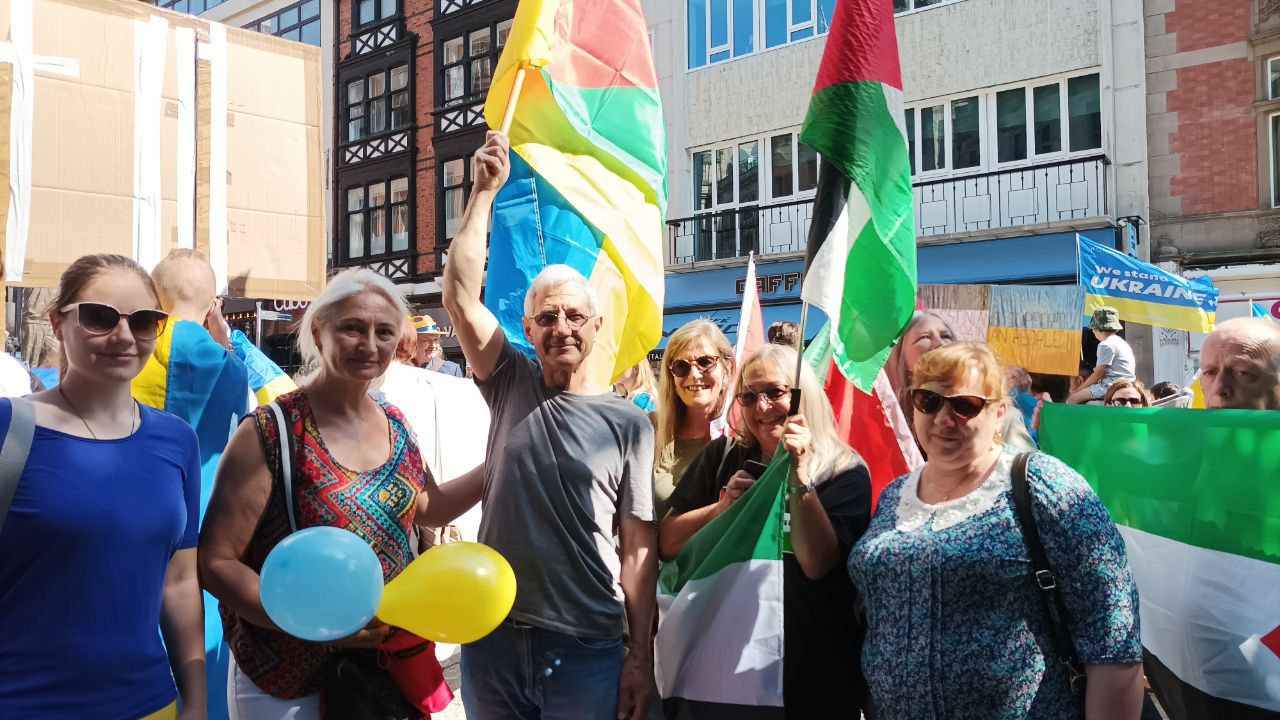
Adib Shaheen (center) at the demonstration. Photo from personal archive
You go to rallies in Britain with two flags, one Ukrainian and one Palestinian, and in your book you compare Ukraine and Palestine. Please tell us about this comparison?
From the very beginning of this war in Gaza, I went to pro-Ukrainian demonstrations with two flags. People asked me why I was doing this. I answered that I lived in both Palestine and Ukraine, so I know both contexts. The parallels, in my opinion, are obvious: there is an aggressor who behaves the same way everywhere. Both the Israelis and the Russians behave in the same way and even use the same rhetoric. They try to dehumanize those who are oppressed and attacked, while pretending that they are victims who are just defending themselves.
I always went to protests with my double flag, always said that I was a Ukrainian-Palestinian. And I see these parallels and tell everyone about them. Because I am fighting for the Ukrainian people to have the opportunity to live on their land without outside interference, I am fighting for the occupiers to leave our land. I also want the occupiers to leave the Palestinian land. Now in Donbas, the occupiers and Russian immigrants are taking over empty houses that once belonged to Ukrainians. Something similar is happening in Palestine.
Since November last year, every Saturday I have attended a demonstration in London with my flag. There, I was approached by Poles who support Ukraine. After our conversation, they began to come to demonstrations in solidarity with the Palestinian people because they saw historical parallels. Now we are working with them remotely on a plan for a joint solidarity campaign with the Ukrainian and Palestinian peoples.
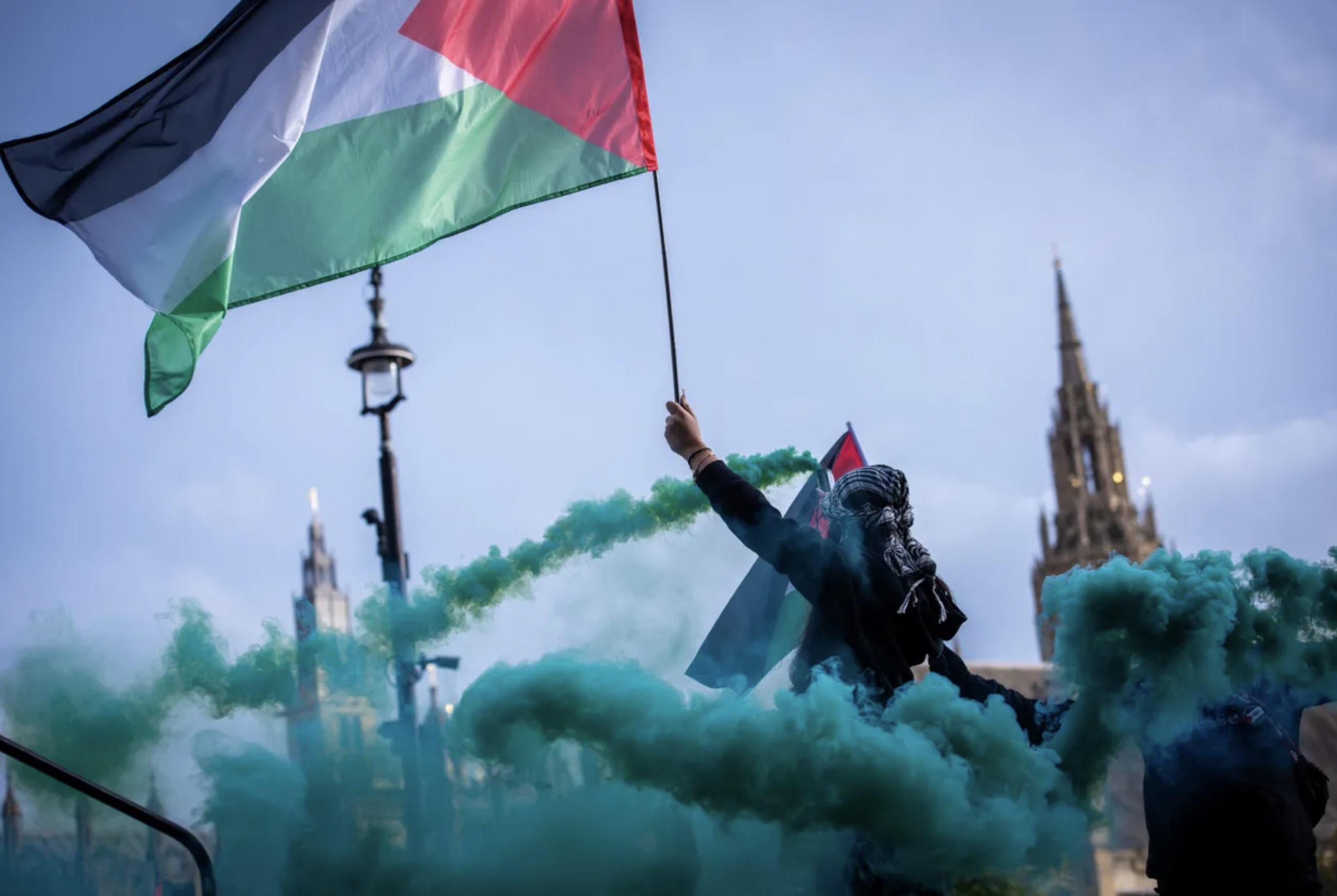
Action in support of Palestine in London. Photo: Loredana Sangiuliano / SOPA Images / ZUMA Press Wire / Scanpix / LETA
You have been preparing a campaign to stop a factory in the UK that produces weapons for Israel. Tell us more about it.
There are several military factories in the UK that produce drones for the Israeli army. Our comrades are constantly organizing actions there, trying to surround the factories so that workers cannot go inside and products cannot get out. This is how they show their solidarity with the Palestinian people.
This movement actually has a long history. The predecessors of these activists used the same methods in the ports: they detained ships with weapons for South Africa [when there was apartheid there – ed.] There was a big campaign to boycott the South African government. It was a very well-organized and effective solidarity campaign. Today, this tradition is continued by other activists working in Palestine, the United States, and Britain. Historical experience has taught these people that there can be no security for anyone without a just peace; they also understand that sanctions and stopping investment from Israel can put pressure on the Israeli government and on society. The latter, unfortunately, supports repression when it keeps silent about the crimes of its government and votes for far-right fascists.
It's not just about Palestine, it's about humanism, about our basic rights. First and foremost, the right to life of all people around the world, which is being attacked by the Israelis in Palestine and the Russians in Ukraine, and which is being attacked by those who support and sponsor the aggressors (in Israel's case, the Americans and the British). I recently read the news that President Biden has ordered American sailors to make a temporary port in Gaza to bring in humanitarian aid. I am outraged by this. All he has to do is call Benjamin Netanyahu and say, "Dear Bibi, if you don't stop this and open the border with Egypt immediately, I will stop sending you weapons, ammunition, and money!"
At one of the demonstrations, I said that I was not asking for anything. Absolutely. I have a piece of paper with the words "Declaration of Human Rights" written on it. I hold it up and tell everyone: Here, I want nothing more than this. Take it, read it, and demand from your rulers in London, Washington, everywhere that they put pressure on those who are committing genocide in Palestine. Just follow the ideas contained on this piece of paper – that's all I ask of you.
What are the current needs of people in the occupied part of Palestine? What is the situation there now?
First of all, people there need food and drinking water. Locals stand in long lines to get water, some with a bottle, some with a basin. This resource is controlled by Israel. The blockade in Gaza began in 2007. Since then, Israel has been sending aid and then cutting it off. And now Gaza is simply blocked. They even closed the border with Egypt, which is allegedly not controlled by the Israelis… In fact, the Israelis have complete control over the air and do not allow the Egyptians to open the border to trucks at all. Once, the Egyptians tried to let a few more trucks into Gaza, and an Israeli warplane flew in and bombed them. After that, the Egyptians stopped such attempts. The Israelis do let the wounded to Egypt, but it happens very rarely.
The situation in hospitals in Gaza, or rather what's left of them, is extremely difficult. Doctors and volunteers from all over the world are going there. They work there for a week or two, then leave, and others take their place. Those who have left, talk about their impressions: the wounded are placed in the corridors, and operations are performed without anesthesia on the dirty floor. These volunteers say that they have never seen anything like this in their lives and have never imagined it possible. No conditions, no humanity. The Israelis have created a real hell in Gaza — a hell for 2 million 300 thousand people.
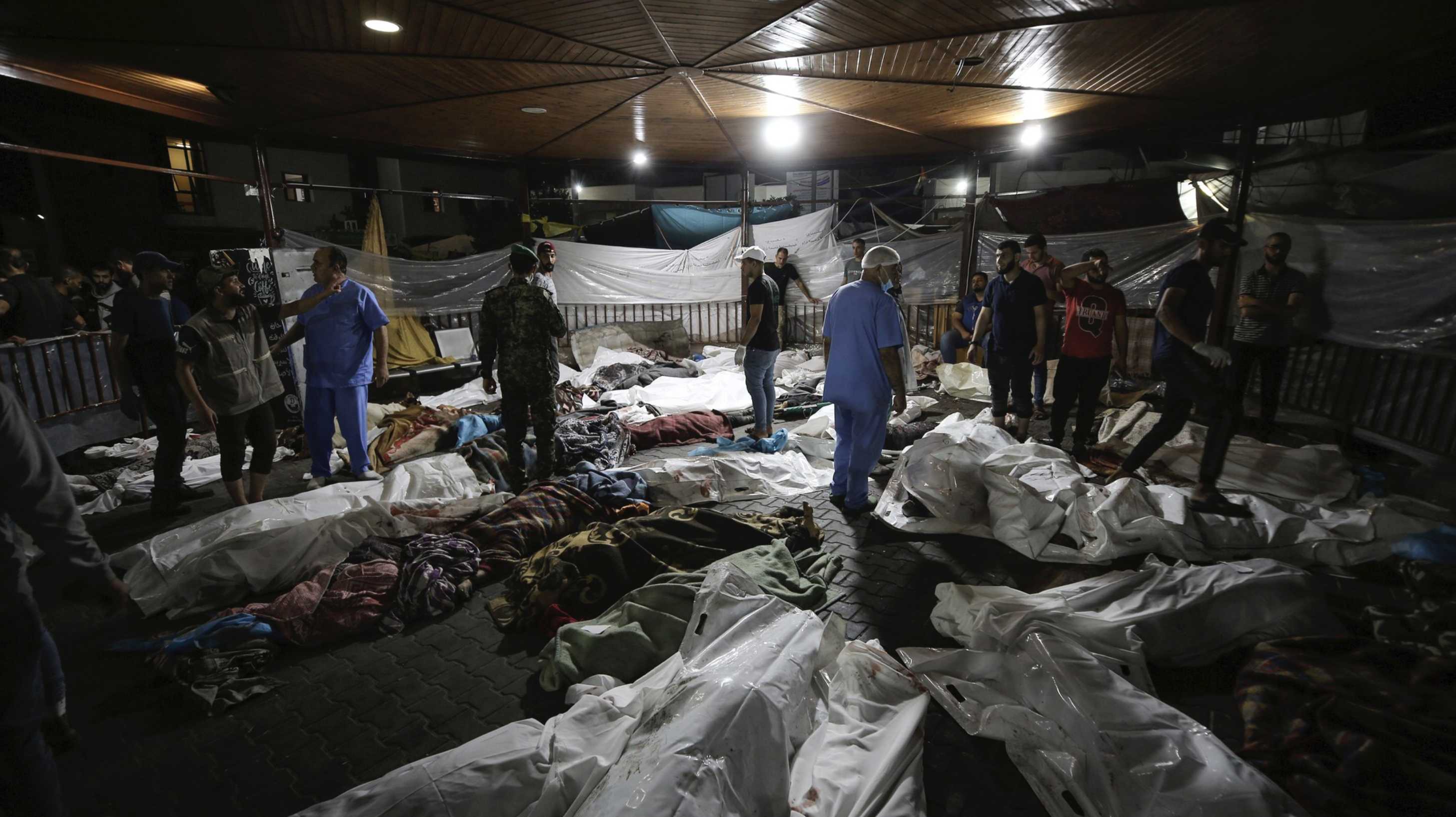
The bodies of Palestinians killed in an explosion at al-Ahli Arab Hospital in the Gaza Strip, October 17, 2023. Photo: AР
Two Israeli ministers who live in illegal settlements [in the West Bank – ed.] are pursuing a very aggressive, openly genocidal policy. There are many extremists in the Israeli government, but these two are outright Nazis. They can be called that because they say: "We must completely stop the supply of food to Gaza." They want to block the path of the little bit of aid that is still being allowed to pass through. Currently, 500 humanitarian trucks are needed in the occupied territories every day, of which Israel allows between 20 and 100, depending on the mood. As a result, the situation of people under occupation is getting worse day by day. People in occupation die not only from bombs, tank shelling and sniper attacks, but also from malnutrition. First and foremost, children are being deliberately killed, deprived of access to food.
How do you see a solution to the Israeli-Palestinian conflict?
To answer this question, we need to think about what should happen to the Israelis [who now live in Palestine – ed.] They can live where they live now, but live on equal terms with the rest of us, that is, with the Palestinians. Now each of them is armed and can go wherever they want. They are strong, so they are feared. In addition, Palestinian and Israeli settlements now look like a chess board, and it is impossible to draw a border between the two countries.
Therefore, I see only one way out: to take that piece of paper with the Declaration of Human Rights and demand equal rights for all residents of this territory. I call it Palestine. Call it Israel, call it Palisrael, call it Israeltina – I don't care, it's not about that. It's not about religious, national or other peculiarities, but about the threat that people from different parts of the world are suffering from. It is about the basic rights of ordinary people. And if we recognize that we are all human beings, it doesn't matter if I am Jewish, you are Palestinian, he is British, Ukrainian or Chinese.
I don't want to do to the Israelis what they did to my people. The house in which I was born and raised, the house that belonged to me, is now on the territory of an Israeli settlement. Other people live in it, and I am not going to drive them out. But I have always emphasized that Israel will destroy itself with its racism. Racism is a weapon that kills not only those against whom it is directed, but also those who use it. Israel was created on Zionist and racist principles as a state for Jews. And this ideology creates a situation that will eventually lead to the destruction of Israel itself.
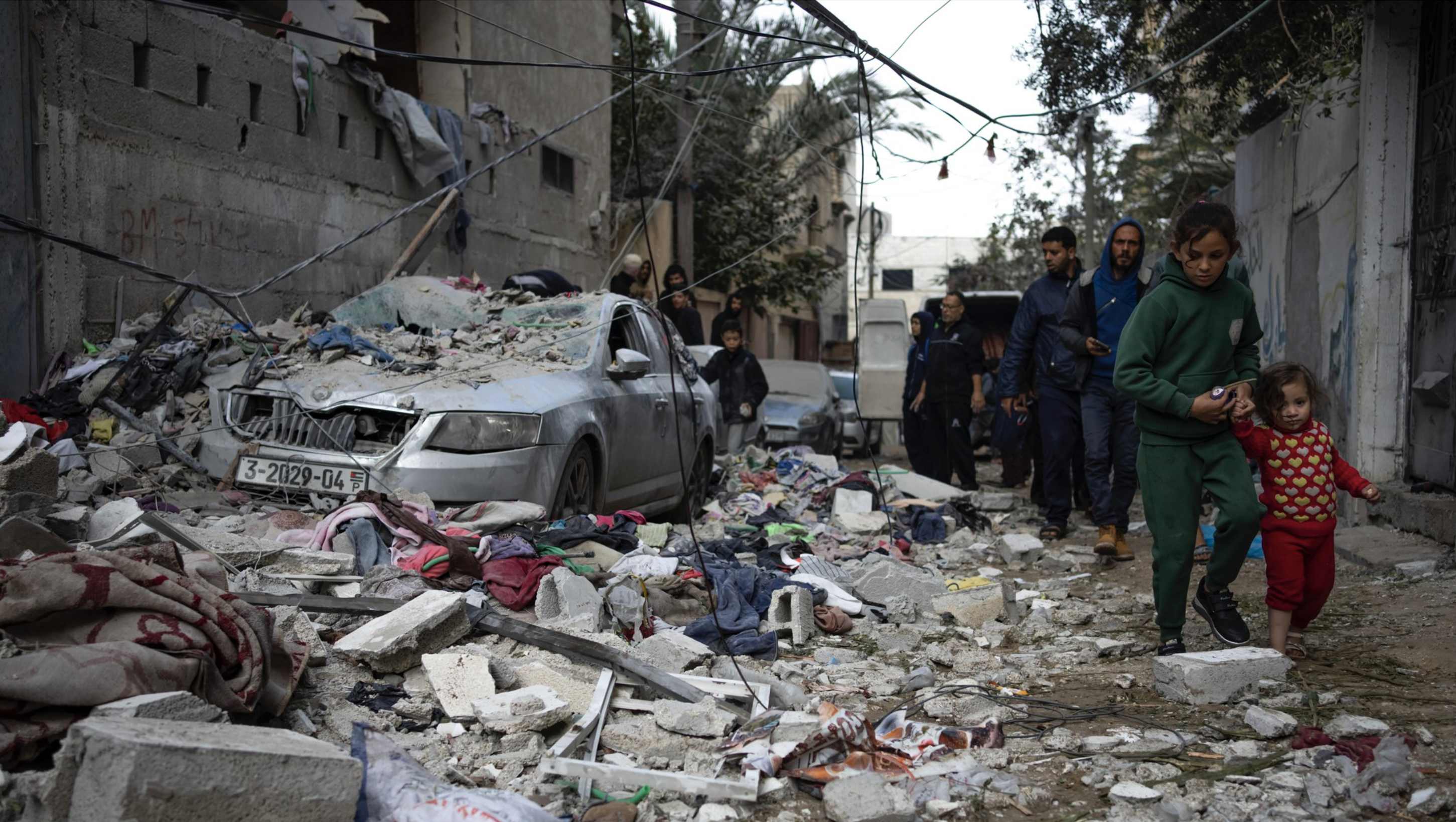
Devastation after an Israeli airstrike in Rafah, Gaza Strip, on February 9, 2024. Photo: AP / Fatima Shbair
Tell us about your experience of losing your land and living under occupation.
In 1994, I was released from an Israeli prison for resisting the occupation and went with my cousins to a plantation. This is our family citrus plantation in the Jordan Valley. So we are in the West Bank, in the occupied territory, sitting, drinking coffee, talking. Then, literally a hundred meters away from our house, an ATV drives along a dirt road. A young guy in a military uniform, an assault rifle hanging on his shoulder, and a young girl sitting behind him. I was outraged by this. First, they are driving through Palestinian territory, which is very arrogant of them. Secondly, they are acting recklessly, because one of the locals could get angry and throw a stone at them, and they could fall into a ditch, get injured or even die. In other words, they deliberately disregard safety because they have guns and believe that Palestinians cannot be a threat to them.
My cousin, who is 20 years older, explained to me that these are the children of settlers. They got a luxurious free apartment, seeds, fertilizer, anything they wanted, a long-term loan, and the opportunity to grow whatever the market is interested in. They were assured that even if you come with empty pockets, you will live well – so they do.
My brother told me that this soldier's parents met on our land when they were just starting to work in the settlement. Prefabricated houses were built just for them. They got married, and in 1969 this guy was born. When we saw him, he was 23-24 years old, he had already served in the army and returned home. Let me emphasize: home, the place where he was born.
If this couple had had a child in 1995, she would have been 20 in 2015. And if she had given birth to a child herself in 2015, that child would have been 7 years old in 2024. This boy would go to school, and the teacher would ask him: "Shlema, where were you born? Where are you from?" And he would answer: "I was born in Hamra." Hamra means red in Arabic. It is a field of 10 thousand dunams [1000 hectares – ed.] that got its name because of its red soil. The settlers didn't bother with another name and called the settlement Hamra, which means Red. And this child will say: "I was born in Hamra, my father was born in Hamra, my grandfather was born in Hamra." How can you tell this child that he is a settler or that his great-grandfather came from somewhere in Europe? This does not concern him, his homeland is here. He is not a settler, he was born and lives on this land, his parents and grandparents were born here.
So when I say “Palestinian people”, I mean those who live in Palestine: whether they are Jews, Christians, or Muslims, it doesn't matter. They are all Palestinians to me. I call them that because that is the name the land gives them. And you can rename the state any way you want, because you remain, and you belong to this land.
In order for it to be a purely Jewish state, all others must be expelled. Now in Palestine, historical, geographical Palestine, there are equal numbers of Jews and non-Jews, as they like to call them. Approximately 7 million Jews and 7 million Palestinians. For me, that's 14 million Palestinians. And if you expel all the non-Jews, it will be another huge crime. The blood of these people, their suffering will remain not only on the conscience of those who will actually be engaged in killing and expelling them, but also on the conscience of Biden, Sunak, and the rest of the politicians who will support them.
But in the twenty-first century, such a crime is more difficult to commit than 100 years ago, when the Turks, for example, exterminated the Armenians, or 80 years ago, when Hitler exterminated Jews and others in concentration camps. Today, no one is waiting for the crime to happen, the world is rising up against it.
If a military patrol in the occupied territories stops a Palestinian who does not have an identity card, he is beaten and imprisoned for 18 days, allegedly to check who he really is. And if an Israeli is stopped, he can spit in the policeman's face, or, if the situation is serious, he can call someone to bring his ID. But Israelis do not walk around with their IDs. For Palestinians, it is dangerous to leave the house without an ID. The police can identify the detainee the next day, but they will still hold him for 18 days and abuse him.
So when I leave the house, my hand automatically reaches for my wallet in my pocket to check if my ID is still there. When I settled in Ukraine and received my Ukrainian passport, I always carried it in my pocket. My friends and colleagues would laugh at me, and I would always answer: you have not been in my place, you have not lived that life and that occupation, you do not know that fear. And this is just a small part of what people have been going through all these years, since 1948.
Today, people are often radicalized to the right, becoming radical nationalists. In Ukraine, jokes about dead Russian soldiers are now common. You must have witnessed something like this in Palestine. Can such views lead to any positive change?
No, they do not lead to anything good. At one time, after 2014, Oleh Tyahnybok, the head of the Svoboda party, had the following slogan: "Nationalism is love". I wanted to correct it: "Patriotism is love. Nationalism is hate."
If I see myself as a human being, then I am a human being. And I can love my country, yes. But if I see myself exclusively as a Ukrainian or a Palestinian or a Frenchman or something else, I immediately reject other people on the basis of nationality, as if my nation is better than others. Being here in Britain, I see people from African countries, India, Jamaica, and Arab countries on the streets, and they live full lives. In terms of the Declaration of Human Rights, we are all equal. I like this approach. Sometimes, of course, you feel racism, but for the most part, people's position is absolutely adequate.
In Israel, there is a concept called Aliyah, which means "rising," "ascent." This is the name of immigration to Israel. For example, you lived in Argentina and ascended to Israel. Aliyah is a religious ascent. Olim Hadashim means "those who ascended." Israel is a state for the Jews as God's chosen people, but there is also an ethnic meaning here, as if Jews are not only adherents of Judaism but also an ethnic group. And there are also cases when people emigrated from Israel. They are called Yordim — "the fallen ones," "those who fell down." The whole ideology is hidden in these two words. The ideology of superiority not only over the Palestinians, who can be oppressed because they are weak, but also over other peoples.
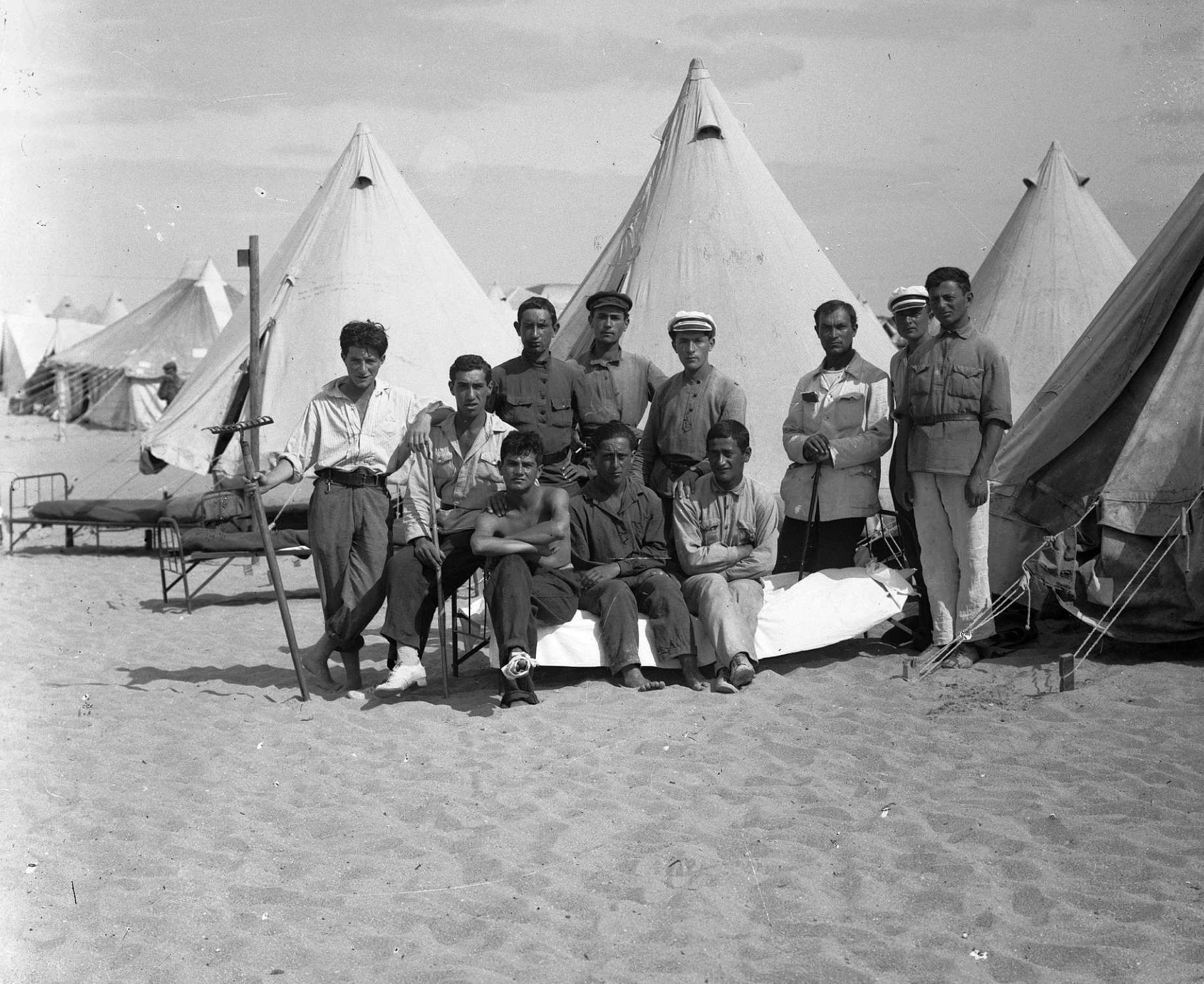
Camp of displaced persons near Tel Aviv, 1920-1930. Photo: United States Library of Congress
Therefore, nationalism is not love, unlike patriotism. I love my homeland, the country where I was born, and I live with other different people. We are building the world together. And if someone attacks, no matter who it is, we will fight back, not to protect the rights of the nation, but because aggression, military aggression in particular, is an attack on basic human rights: to live freely, to say what you want, to do what you want, as long as it does not interfere with others and does not infringe on their freedoms. Since I am a Marxist, I always try to talk to people based on universal humanistic values. I see a rescue in socialism and believe that it is worth talking about it in a clear language. That is why I tell people: we live together, we follow certain rules, based on the Declaration of Human Rights.
Among Ukrainians, one often hears the idea that Palestinians are against Ukraine. Also, that Ukraine should be like Israel: a high-tech, well-protected state. Why in your view Ukrainians do not see that the common problem of Palestine and Ukraine is imperialism? And why is there such a positive attitude toward the state that embodies this imperialism?
This question can be answered in one word: propaganda. Let's start with Palestine. The Palestinians have been suffering from aggression and occupation for decades: the British occupation in 1917, then the creation of Israel in 1948, the partition of Palestine, and later its full occupation in 1967. This is more than a hundred years. So they have been very critical of the American imperialist establishment.
I am 65 years old now. I have not lived a single day of these 65 years normally, even when I was studying in the Soviet Union in wonderful conditions as a student. I was with my land, with all the oppressed people. As a Marxist, I was in solidarity with the Vietnamese and Cubans, with the Nicaraguans and South Africans. I felt their pain and supported them.
And who supported the aggressor who attacked me and my people? The United States, this imperialist state. We all know the story of the extermination of the Native Americans, of racism, imperialism, and military adventures around the world. They invaded Vietnam and killed people there. They supported the coup in Chile, removed the democratically elected government of Salvador Allende and installed a fascist who brought a lot of grief to his people. It seems to me that there is not a single country that has not suffered from US imperialist aggression. So I don't believe that Americans have suddenly become kind and are helping Ukraine from the bottom of their hearts. No one can convince me that the United States is a good country. Yes, some people there live well. And even Palestinians who emigrate there say that they live in luxury. But this does not negate the fact that it is the most brutal and cruel state that has been helping those who oppress Palestine for 75 years. You can't convince a mouse that there is a more terrible animal than a cat. But the cat and those who help and feed the cat are part of the same chain.
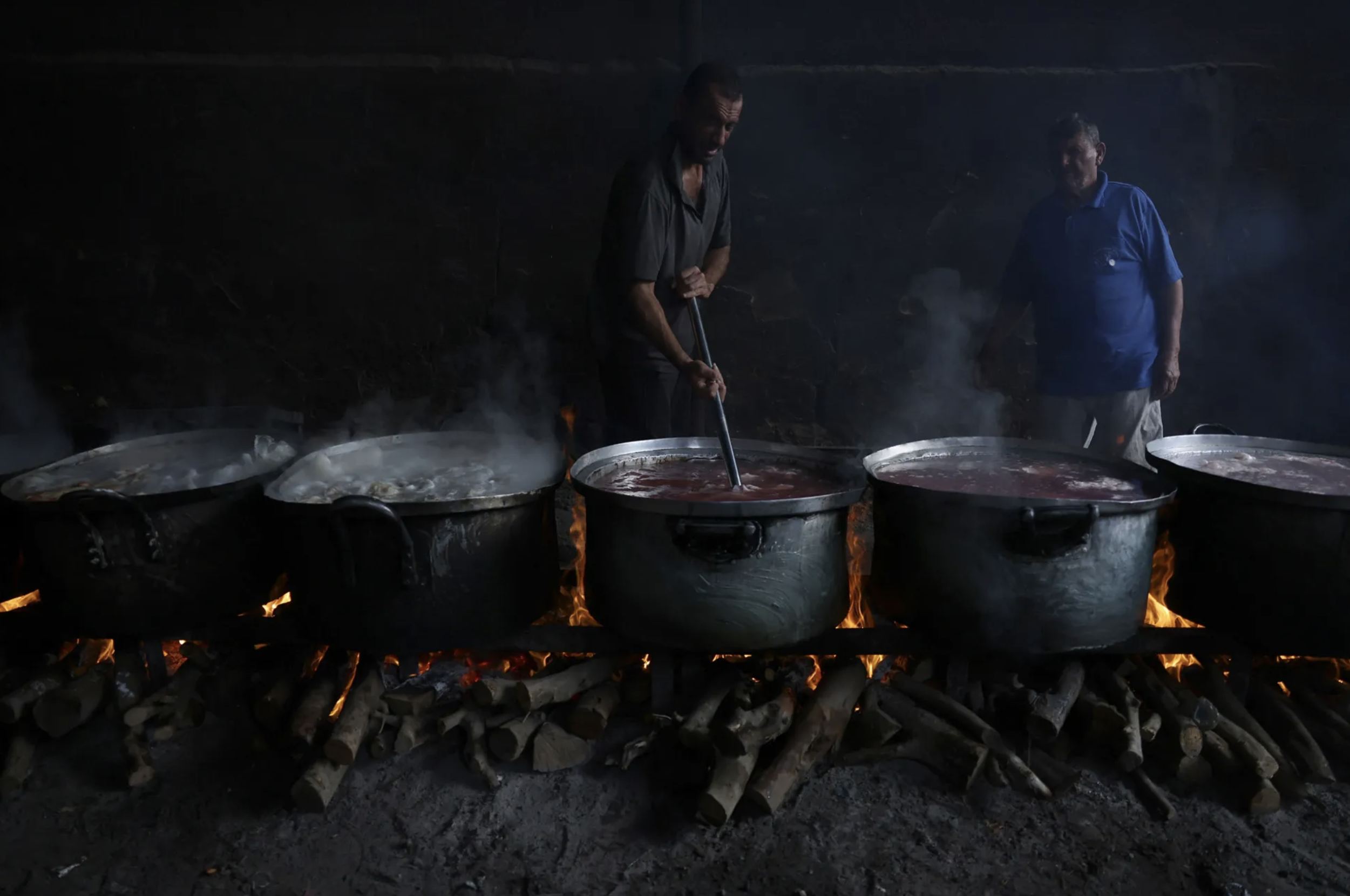
Palestinians cook with wood because of the lack of gas. Photo: Said Khatib / AFP / Scanpix / LETA
As for Russia, it has its own TV channels in Arabic, which conduct systematic propaganda. Because of this propaganda, many graduates of Soviet universities, my peers, believe that Russia is a continuation of the Soviet Union. I try to convince them that this is not the case. Yes, Russia inherited nuclear weapons from the USSR and a seat on the UN Security Council, but these are all technical details. The ideological and socio-political system in the Russian Federation now has nothing to do with the Soviet Union. But it is impossible to prove this to my friends and colleagues with whom I once studied: they are convinced that Russia is simply defending itself against NATO.
Russian propaganda uses the history of the Soviet Union's support for the Palestinian people's struggle to justify Russia. It's impossible to convince people that this is a false idea. They say that Americans have their own interests when they support Ukraine. We can agree with that. But on the other hand, the Russians are attacking Ukraine, occupying its territory, just as the Israelis occupied Palestinian territory. Russians are killing Ukrainians, just as the Israelis kill Palestinians, they are destroying cities and throwing rockets and bombs at civilians, just as Israelis do in Palestine. It seems like simple logic, but Palestinians don't want to understand it. They listen to Al-Mayadeen, an Arab TV station that constantly broadcasts pro-Russian propaganda, glorifying Russia and opposing it to Israel and America.
In Ukraine, in a sense, the situation is reversed. In addition to pro-American and pro-European propaganda, there is also Zionist propaganda, often through immigrants who came from the Soviet Union and Ukraine to Israel but keep in touch with their relatives and friends in Ukraine. I have friends who received help from their brothers, sisters, relatives, and neighbours in Israel since the beginning of the full-scale invasion. And here's what Ukrainians see: Hezbollah and Iran are helping the Palestinians, and Iran sends drones to Russia, which then bombs us with these drones. So it turns out that the Palestinians are our enemies. You explain to them that they are also people, that they have the right to live, that they are being bombed and killed, just like you. But they don't understand. Israel's propaganda also affects Ukrainians.
Obviously, there is aggression and occupation both there and here, but people don't want to see it. For me, this is just absurd. How can Ukrainians or Palestinians support any occupation? How can you support the occupation of someone else's land, the killing of other people, if you know from your own experience what that means? Unfortunately, on the part of both Ukrainians and Palestinians, there is a devaluation of the occupation of others, a devaluation of the suffering of ordinary people.
How do you think it is possible to maintain a sober mind and not succumb to propaganda? Where is the antidote to it?
First, it's hard work. When something happens, like a flood or an earthquake, you start to dismantle the ruins, to mitigate the consequences of the disaster. And then you start building something. This is a slow process. But the blood that has been shed in Palestine since October 7, 2023, has accelerated the process and worked as an antidote to imperialist and capitalist propaganda.
I was at the demonstration in London with my double flag and double poster. On one side I wrote: "One democratic state for all its citizens is Palestine and Israel". And on the other: "Capitalists make wars for profit." Primitive people fought to eat, fought for resources when some other group entered their territory. But modern wars are started for profit: for uranium, diamonds, oil, agricultural land, water, etc… "We need this and that. What are you, locals? Get out of here. Otherwise, we will shoot you." This is one side of the issue.
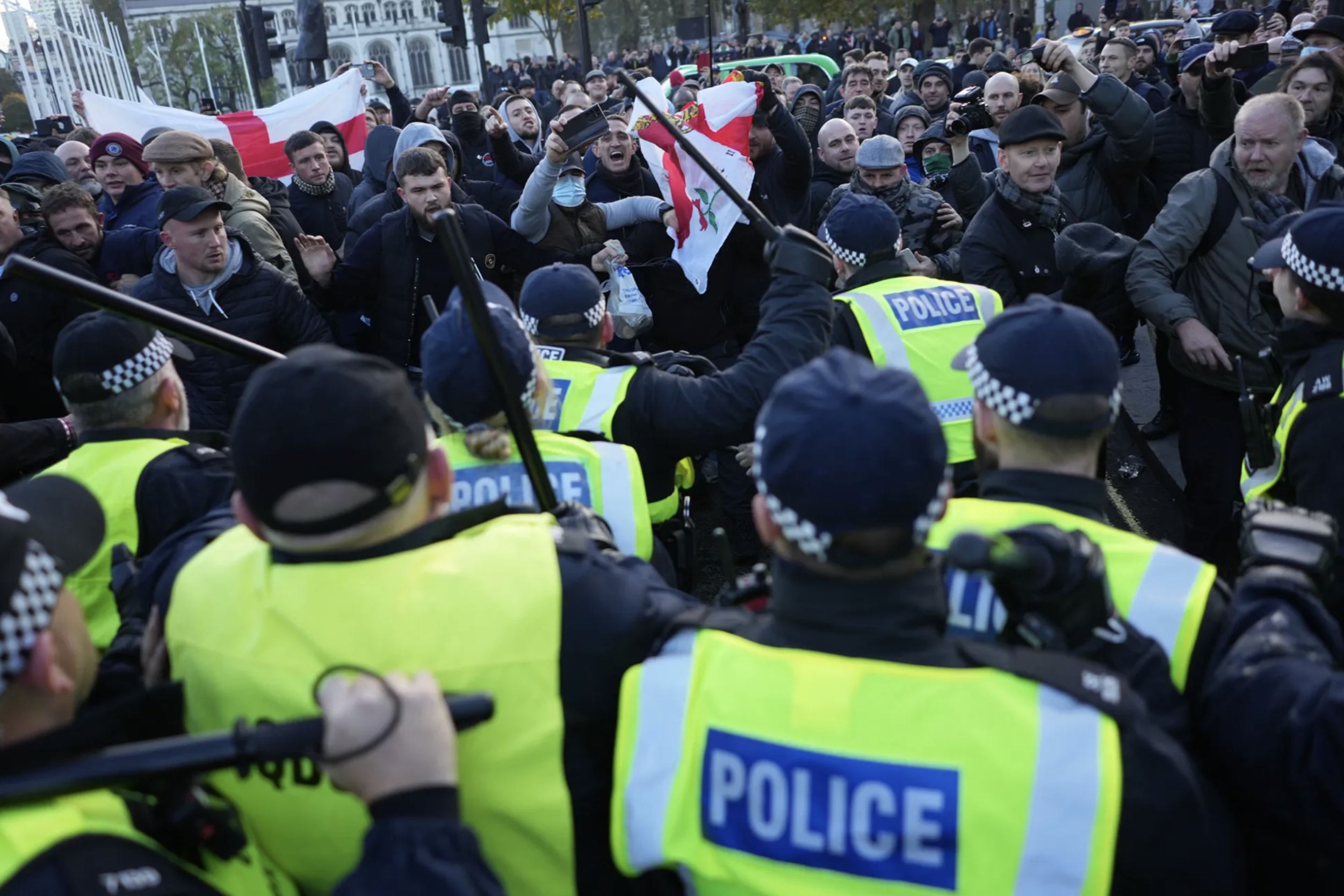
Clash between British police and opponents of the march in support of Palestine. Photo: Jeff Moore / PA Wire / PA Images / Scanpix / LETA
The second side is the sale of weapons, the military-industrial complex. How do you convince people to buy weapons if you are engaged in their production? You don't say in an advertisement that it's good to kill people. You need a different approach, a more creative one. For example, there is a conflict between Ethiopia and Egypt over the construction of a dam on the Nile, which could escalate into a military clash. Arms manufacturers are directly interested in this, because then they will be able to sell ammunition to Ethiopia or the Egypt. Or both. This is what capitalism is. It is an aggressive policy and an aggressive ideology.
Capitalism is, first of all, when the owner takes away the added value of the product from the worker and gives him a tiny part of the value of the goods for his labour. The one who previously stole his first million can finance production and force others to work for him. So there is already a certain aggression here: people agree with the capitalist only because they have no other choice.
Capitalism is an ideology according to which I will do anything to make more money, no matter at whose expense. The employer looks at employees as numbers. He only cares about the profit at the end of the financial year. And arms production is a very profitable business. But for weapons to be in demand, there must be an enemy. Terrorists, Muslims, anyone. No enemy? It's okay, we'll create one. All this is to make this profit-oriented system work. And people are all nonsense. That's why this piece of paper with the Declaration of Human Rights is worthless to capitalists.
When you look at things globally, everything fits together and it becomes obvious that we have to fight.
Yesterday I spoke to a friend of mine about the Nottingham demonstrations. They are attended by 300-500 people, once by a thousand people. He asked me, what will it change? Well, now we come to the demonstrations, people come out with Palestinian flags, those driving by wave at us from car windows, but it is all at the cost of Palestinian blood. For five months of slaughter, murder, bloodshed, and destruction since October 7, all the powers turn a blind eye, saying that Israel has the right to self-defence. Ordinary people are tired of this, they are demonstrating – especially in the United States, Europe, and Britain.
When the Russians were killing the Chechens, the whole world was silent. And now they are killing Ukrainians, and the world is not silent. This happened because the interests of the United States have diverged from those of Russia. But if, God forbid, the interests of the United States and Russia in Ukraine coincide, I do not envy my compatriots in Ukraine. Even before 2022, I told everyone and continue to repeat: neither the United States nor NATO can be trusted!
We have already seen this in Kabul. The US military mission in Afghanistan lasted almost 20 years. When the Americans were leaving the country, the people they left behind ran after the military planes, trying to cling to the wheels. After the Taliban came to power, literally in the first days after the capture of Kabul, many locals who had cooperated with the Americans were shot and hanged. This is how they are, the Western partners.
I believe that we need to constantly explain what is happening, only then will people begin to understand, only then is social change to overcome the crisis possible. Crises of war, environmental crises, energy crises, etc can only be addressed by genuine socialism. Is there a chance that people will really understand? I believe that yes, the process has begun, we just need to advance these changes. My comrades and I will take part in the transformations and continue to inform people.
Tell us more about the book you are currently working on. What is it about?
It will be about my life, about the life of my people and about the ideology of ethnic superiority that led to this suffering. The book will start from the end, so the first chapter will be about Ukraine and the full-scale invasion. There will be parallels with Palestine.
The next chapter will tell the story of my birth. Why is my birth certificate Jordanian? Because in 1948, when the state of Israel was created, a war broke out between Arab armies and armed Jewish groups in Palestine. This led to the de facto division of Palestine: the state of Israel was formed on one part, Egyptian troops occupied the Gaza Strip, and Jordanian troops were on the third part. In the end, they prevented the Palestinians from creating their own state.
In 1950, Jordan announced the reunification of the West Bank with the East, forming the so-called Transjordanian Emirate, the country that is now called Jordan. When I was born in 1958, my birth certificate was issued by the Ministry of Health of the Hashemite Kingdom of Jordan. I am a Palestinian who was born in Palestine, but according to my passport I was Jordanian. My late father had a Palestinian passport during the British occupation of Palestine, when there was a so-called mandate. On the basis of this mandate, the Palestinian government issued money with the word "Palestine" on it, and had its own migration service. But all the power was in the hands of the British commissioner.
My father and his comrades actively opposed the Israeli occupation, which began in 1967. They created an organization of popular resistance to the occupation. Because of this, he was one of the first people to be expelled from Palestine by the Israelis in 1968, just a year after the occupation began. Then we moved to Jordan, and from there I went to study in the Soviet Union. Later, I returned to Jordan, where I lived for two years, and then returned to Palestine, just in time for the first intifada.
If you are under occupation, you have the right to resist. The right to resist is guaranteed by the Declaration of Human Rights. It is international law. I defended this right with other friends and comrades. And then in 1990, I was imprisoned in Israel, and released in 1994, after which I directed all my efforts to supporting my family. It was very difficult for us at that time. In 2000, the second intifada began. Living in Palestine became even harder and more dangerous, so we moved to Jordan, and from there we went to Ukraine two years later. It happened by chance, through acquaintances, and also because I was an electrical engineer by training, but in Palestine I was engaged in agriculture. I was offered a job in Ukraine, where I worked for quite a while. Then I had to leave everything once again.
Later in the book, I will analyse everything that happened to me. I am only talking about my life and my observations. The chapter on Ukraine is called "Ukraine: From Tragedy to Comedy and Back Again." I have been following the events in Ukraine since the collapse of the Soviet Union, and since the beginning of 2003 I have been living here, talking to people, listening, reading. The most difficult times for Ukraine were the most difficult for me personally. And the threats that Ukrainians are facing now, I know from my own experience, and they cannot be ignored. In the book, I describe how the government changed, how Yanukovych came to power, how the Maidan happened, and all these events.
I always try to think logically, without prejudice. I mean, people say you're a Palestinian, and I say yes, I am; people say you're a Ukrainian, and I say yes, I am. But first and foremost, I am a human being, so I look at everyone from this universal position. When someone is being oppressed, I naturally stand on the side of the oppressed or enslaved, whoever they are. I always raised my voice against oppression and attacks on human rights – this is my approach.



